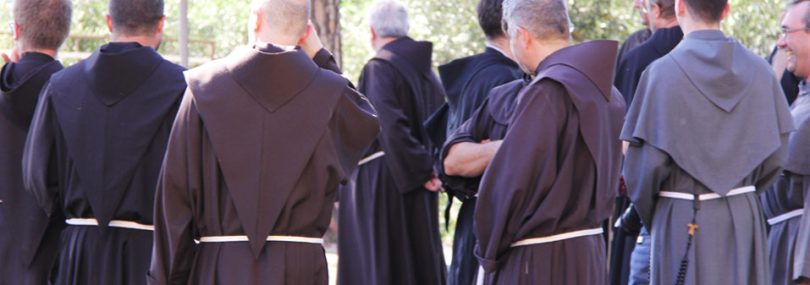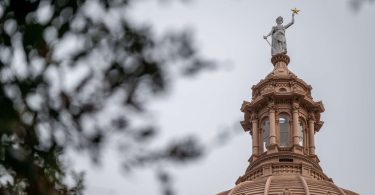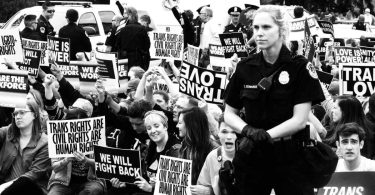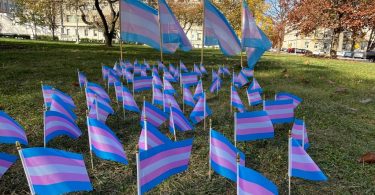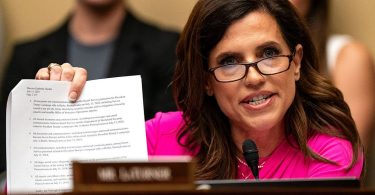
Br. Tyler Grudi, OFM
Today’s posts is from guest contributor Br. Tyler Grudi, OFM, (he/him). Tyler a Franciscan friar studying mission and intercultural theology at Catholic Theological Union in Chicago. He previously studied journalism at St. Bonaventure University, and he has served in a variety of outreach ministries to the poor and marginalized across the country, such as St. Francis Inn in Kensington, Pennsylvania.
When many Franciscan friars come together, inevitably someone will ask why all our habits are different shades of brown. The truth is, there’s no official reason, as if one shade is better than the other. Some habits are discolored from years of use, while others vary slightly depending on what fabric was available at the time. Some habits, like mine, are hand-me-downs from friars long laid to rest, while others are crisp and new.
Whatever the reasons, the unique shades of brown reflect something beautiful about how Franciscans embrace the whole human family. Just like our varied habits, each one of us comes to the Order with a unique set of experiences that makes us who we are. My story with the Franciscans began in western New York State at St. Bonaventure University while living in a men’s discernment house. Over the course of three years, I lived with three other people from ethnic, political, and sexual identities different from each other as we discerned our vocations together. Living in the Serra House allowed me to learn from and grow with people I may not have chosen to live with on my own.
Our house offered space for self-discovery and freed us from expectations that we had to conform to traditional gender/sexuality roles. We were allowed to be normal students, and many of us dated and had girlfriends or boyfriends. As we discerned, the friars never judged us. They accepted us every step along the way, and I quickly learned that the friars didn’t want pious, carbon-copies of St. Francis. They wanted me as I was, without exceptions, for that is who God was calling.
 Franciscans relish diversity. From the shades of our habits to the quirks of our personalities, variety is in our DNA. According to our general constitutions, each friar is God’s gift to the fraternity. Each individual is to be received with great reverence, for each person in their way is a point of contact with the mystery of God. This applies not just to friars but all people, especially LGBTQ+ people who so often experience exclusion and harm from others in the church. As Mary Beth Ingham writes in her book Understanding John Duns Scotus, whose feast the church celebrates today, “Wherever and whenever we love the persons, creatures, and beings around us, there Franciscans identify beauty.”
Franciscans relish diversity. From the shades of our habits to the quirks of our personalities, variety is in our DNA. According to our general constitutions, each friar is God’s gift to the fraternity. Each individual is to be received with great reverence, for each person in their way is a point of contact with the mystery of God. This applies not just to friars but all people, especially LGBTQ+ people who so often experience exclusion and harm from others in the church. As Mary Beth Ingham writes in her book Understanding John Duns Scotus, whose feast the church celebrates today, “Wherever and whenever we love the persons, creatures, and beings around us, there Franciscans identify beauty.”
I was inspired reading the reports from New Ways Ministry’s synodal discussions with LGBTQ+ Catholics who feel hopeful about being in the church despite experiencing marginalization, loss of employment, and mistreatment from pastors. To my knowledge, St. Francis never explicitly takes up the question of sexuality or LGBTQ+ issues, but he does talk a lot about love and what it takes to keep love alive in our communities. It was my experience of fraternal love at St. Bonaventure and the Franciscans’ emphasis on relationship that led me to enter the Order in the first place.
Francis, like his brothers after him, had a gift for meeting people where they were at. In a collection of admonitions to his brothers, Francis attests that “what a person is before God, that person is, and nothing more.” In a different letter, Francis encourages his brothers not to expect anything from anyone, challenging them to remove every obstacle that impedes them from loving one another. The kind of love Francis described was love without conditions or clauses; love that manifests as service to all people. “Love,” Francis says, “more than me.”
This Franciscan approach is so important today, for there are many in the church who claim to love LGBTQ+ people, and yet their love often comes at a cost. How many times do LGBTQ+ Catholics hear people say, “Of course I love you, but…” with an expectation that they deny their experience and conform to another’s ideal? This is not love in the Franciscan sense nor any real sense. If I wish someone was a different person, I prefer the fantasy of a person in my mind over the real person standing right in front of me.
At a time when the church is asking us to prioritize concrete realities over ideas, St. Francis shows us a better way to love our siblings that avoids devolving into demeaning abstractions.
First, to love someone means to walk with and among them. Love requires relationship. If we are unwilling to get into people’s lives and journey through life with them, can we truly claim to love them?
Second, we should let people define their own experiences and trust that God is already at work in their lives. One of my formators once said that we must hold each other’s stories with trimmed fingernails. Stories are delicate and require a gentle touch. We should not poke, dissect or claw away at the stories of others, looking for flaws or elements to change. Instead, we should allow them to be what they are, listening closely with an open heart. Who are we to take ownership of another person’s identity?
And lastly, we should learn to let go of our reservations and love without asking for anything in return. In his letter to the entire Order, Francis encourages the brothers to “Hold back nothing of yourselves for yourselves.” Living in fraternity has stretched me to give more and more of myself to my brothers. It’s not easy and takes real commitment and effort. But when I am as vulnerable with my brothers as they are with me, real intimacy and understanding flourish. Every day I hope to show people the same love and affection that the friars and my housemates back at Bonaventure showed me. They loved me for who I was, not the person they wished I would be.
Can more Catholics learn to love their LGBTQ+ siblings, not despite their experiences and identity, but because of them? Maybe if we start to practice these things, we too can see our siblings as God sees us all, as fearfully and wonderfully made.
—Br. Tyler Grudi, OFM, (he/him), November 8, 2024

